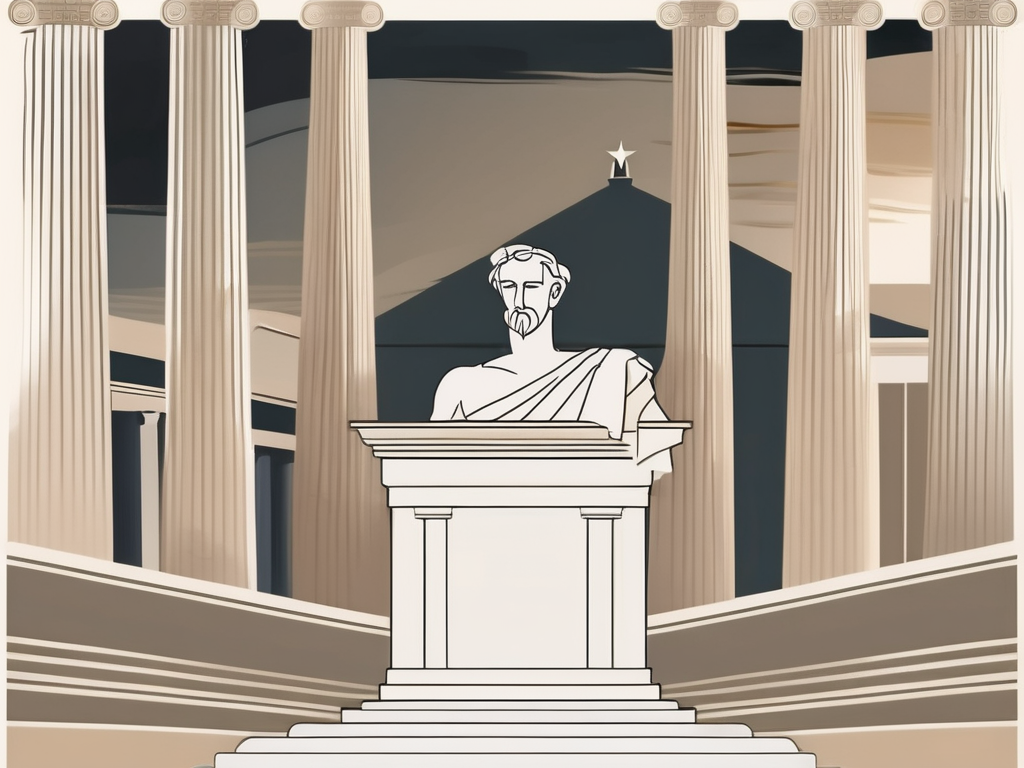Plato, the renowned ancient philosopher, explored the complexities of love in his philosophical writings. His quotes on love provide us with valuable insights into the nature of love and its role in our lives. In this article, we will delve into Plato’s philosophy of love, examine his quotes on the subject, and analyze the influence of his love philosophy on modern thought. We will also explore the intersection of love and wisdom in Plato’s philosophy, as well as consider the critiques and interpretations of his love philosophy.
Understanding Plato’s Philosophy of Love
Before we delve into Plato’s specific quotes, let’s first understand his broader philosophy of love. Love played a significant role in Plato’s philosophical thought, as he believed that love has the power to awaken and elevate the soul. According to Plato, love is not merely an emotion but an essential force that drives individuals towards beauty, truth, and ultimate wisdom.
Plato viewed love as a means to transcend the physical world and reach the realm of the Form, a realm of ideal and eternal concepts. This concept of love became known as Platonic love, which has come to signify a non-sexual and intellectual affection between individuals.
Plato’s philosophy of love goes beyond the conventional understanding of romantic or erotic love. For him, love is not limited to the attraction between two individuals but extends to a universal love that encompasses all beings. This universal love, according to Plato, is a reflection of the divine and connects individuals to a higher spiritual reality.
The Role of Love in Plato’s Philosophical Thought
In Plato’s philosophy, love serves as a catalyst for personal growth and enlightenment. It is through love that individuals can transcend their egoistic desires and ascend to a higher plane of existence. Love, for Plato, is not merely a desire for another person but a desire for the attainment of knowledge and wisdom.
Plato believed that love should be directed towards the pursuit of truth and the cultivation of virtue. He argued that through love, individuals can elevate themselves morally and intellectually, leading to a more fulfilling and meaningful life.
Love, according to Plato, has the power to transform individuals and society as a whole. It is through the practice of love that individuals can overcome their selfish tendencies and work towards the betterment of the community. Love, for Plato, is a force that can bring harmony and unity to a fragmented world.
The Concept of Platonic Love
One of Plato’s most enduring contributions to the philosophy of love is the concept of Platonic love. Platonic love is characterized by a deep emotional and intellectual connection between individuals without any sexual or physical desire. It emphasizes the spiritual and intellectual aspects of love rather than the purely physical.
Platonic love, according to Plato, allows individuals to form profound relationships based on shared values, intellectual pursuits, and a mutual quest for knowledge and wisdom. It transcends the constraints of the physical world and focuses on the higher ideals and eternal truths.
In Platonic love, individuals engage in intellectual discussions, exchange ideas, and challenge each other’s beliefs. It is a love that goes beyond the superficial and seeks to understand the essence of the other person’s being. Platonic love encourages self-reflection and self-improvement, as individuals strive to become better versions of themselves in the pursuit of wisdom and truth.
Plato believed that Platonic love can lead to a deeper understanding of oneself and the world. Through the intellectual and emotional connection established in Platonic relationships, individuals can gain insights into the nature of reality and the ultimate purpose of existence.
While Platonic love may lack the physical intimacy found in romantic relationships, it offers a unique and profound connection that transcends the limitations of the body. It is a love that nourishes the soul and expands the mind, fostering personal growth and intellectual development.
Exploring Plato’s Quotes on Love
Now that we have a foundation in Plato’s philosophy of love, let’s dive into some of his notable quotes on the subject. These quotes shed light on the significance of love and its various dimensions according to Plato.
The Significance of Love in Plato’s Quotes
In one of his quotes, Plato said, “At the touch of love, everyone becomes a poet.” This quote highlights the transformative power of love, as it inspires individuals to express themselves creatively and eloquently. Love ignites the poetic spirit within us, enabling us to see the beauty in the world and articulate it through art, literature, and music.
Another profound quote by Plato is, “Love is a serious mental disease.” While this quote may seem unconventional, Plato suggests that love can be all-consuming and overpowering. It can drive individuals to madness or obsession, disrupting rational thought and leading to irrational behavior.
Interpreting Plato’s Views on Romantic Love
Plato’s views on romantic love can be seen in his quote, “Love is born into every human being; it calls back the halves of our original nature together; it tries to make one out of two and heal the wound of human nature.” In this quote, Plato suggests that romantic love is a longing for wholeness and unity.
According to Plato, romantic love is not solely driven by physical attraction but by a deep yearning for completeness. It is a desire to find our other half and restore our original nature, which has been divided and fragmented in the human experience.
The Influence of Plato’s Love Philosophy on Modern Thought
Plato’s philosophy of love continues to exert a profound influence on contemporary society. His views on the transcendent nature of love and its ability to elevate the human spirit resonate with many individuals today.
Plato’s Love Philosophy in Contemporary Society
Plato’s ideas on love have found resonance in modern relationships and have influenced the way we perceive and approach love. Many individuals seek to incorporate the principles of Platonic love into their relationships, emphasizing emotional intimacy, intellectual connection, and shared values.
Plato’s love philosophy encourages individuals to view love as a transformative force that goes beyond physical attraction and encompasses the pursuit of self-improvement, personal growth, and the search for wisdom.
The Enduring Relevance of Plato’s Love Quotes
Plato’s quotes on love continue to be widely quoted and discussed, testifying to their enduring relevance. His insights into the nature of love and its profound impact on human existence resonate with people of all ages and cultures.
From romantic relationships to friendships and familial bonds, Plato’s love quotes remind us of the timeless principles and ideals that guide our connections with others. They inspire us to aspire to higher forms of love and to seek wisdom and understanding in our relationships.
The Intersection of Love and Wisdom in Plato’s Philosophy
For Plato, love and wisdom were intimately connected. He believed that love serves as a path to wisdom, and wisdom, in turn, amplifies the power of love. Love and wisdom, according to Plato, are intrinsically linked and mutually reinforcing.
Love as a Path to Wisdom in Plato’s Thought
In Plato’s philosophy, love is not merely an emotion but a transformative force that leads individuals to intellectual and spiritual enlightenment. By pursuing love and cultivating deep connections with others, individuals can expand their horizons, gain new perspectives, and acquire wisdom.
Plato argued that the journey towards wisdom begins with the recognition of our own ignorance. Love inspires individuals to seek knowledge and truth, driving them towards the pursuit of wisdom and self-discovery.
The Connection Between Love and Knowledge in Plato’s Quotes
Plato famously stated, “Knowledge which is acquired under compulsion obtains no hold on the mind.” This quote highlights Plato’s belief that true knowledge can only be attained through love and voluntary engagement.
According to Plato, love kindles the desire for knowledge and enables individuals to acquire knowledge willingly. Love creates an intimate connection between the lover and the beloved, fostering an environment conducive to the acquisition and assimilation of knowledge.
Critiques and Interpretations of Plato’s Love Philosophy
While Plato’s love philosophy has had a significant impact on philosophical and cultural discourse, it has not been without its critics and alternative interpretations.
Differing Perspectives on Plato’s Love Quotes
Some critics argue that Plato’s emphasis on the intellectual and spiritual aspects of love neglects the importance of the physical and emotional dimensions. They contend that Plato’s idealization of an abstract notion of love fails to capture the complexity and richness of lived experiences.
Others interpret Plato’s love philosophy as an invitation to balance and integrate different dimensions of love, combining the intellectual and spiritual with the physical and emotional.
The Debate Over Plato’s Concept of Love
The concept of Platonic love has been subject to ongoing debate and reinterpretation. Some scholars argue that Platonic love should be understood in a broader sense, encompassing various forms of non-sexual and intellectual intimacy.
Others argue that Plato’s concept of love should be seen as representative of his own historical and cultural context. They contend that Plato’s views on love must be understood within the framework of ancient Greek society and its social and moral norms.
In Conclusion
Plato’s quotes on love offer us valuable insights into the philosophy of love. Through his philosophical writings, Plato invites us to contemplate the transformative power of love, its connection to wisdom, and its role in personal growth and enlightenment.
While Plato’s love philosophy may not provide definitive answers to the complexities of love, it continues to stimulate thought and discussion, reminding us of the enduring quest to understand the nature of love and its profound impact on our lives.












